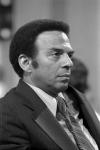Biography
Other info : Bibliography
Andrew John Young was a
Scottish poet and clergyman. His status as a poet was recognised quite
late and he received the Queen's Gold Medal for Poetry in 1952.
Andrew Young was born to the stationmaster of Elgin in Scotland in 1885. Two years later his father moved to Edinburgh, where young Andrew attended the Royal High School and later took an arts degree at the University of Edinburgh. The disappearance of his brother David in discreditable circumstances in 1907 so affected him that he gave up his intention to become a barrister and instead studied theology at the local New College . Old habits died hard, however, and his first collection of poems, Songs of Night, a work of Swinburnean aestheticism, was published in 1910 at his father’s expense - pillar of the presbytery though he was.
Ordained into the United Free Church of Scotland in 1912, Young was appointed two years later to his first ministry in the village of Temple, Midlothian, and married Janet Green, who was lecturing in English at a teacher training college in Glasgow. Thereafter she devoted her energies to looking after their two children, Anthony (1915–1987) and Alison (1922–2001), and making it possible for her husband to pursue his literary career.
After the hiatus of war service, Young’s next appointment took him to Sussex where in 1920 he became the minister of the Presbyterian Church at Hove. In that year too Boaz and Ruth, his next collection was published, shortly followed by several more. The style was now that of the Georgian poets, among whom he had many friends. He was later to renounce these books upon achieving the honed and focused nature poetry of Winter Harvest (1933) and the four later collections that he called his canon. Earlier poems were now ‘quarried’ and rewritten in his new style. The change was signalled by signing these poems as Andrew Young, rather than A.J.Young as formerly, and it was only from the publication of the 1960 Collected Poems that editors began to use selections from the earlier work again.In 1939 he applied for admission to the Anglican ministry and in 1941 became Vicar of the rural parish of Stonegate in East Sussex. In 1959 he was enabled to retire and moved to Yapton, where he had become a canon of the nearby Chichester Cathedral. The work of his later years included the two long religious poems of Out of the World and Back (1958), highly regarded at the time, and several prose works dealing with botany and the landscape. His literary reputation was being fostered in these years by Leonard Clark, who made selections and collections of his poetry between 1959-1974. Thereafter his daughter, who had married the poet Edward Lowbury, continued the work.[1]






